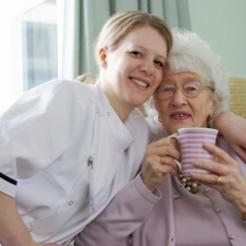George Ames is sick of care getting a bad name. It's time charities and other service providers worked together to show the public the full picture.
The word 'care' has some very ugly connotations. The strong link to illness, death, disability and vulnerability and the idea of losing control and independence makes it an emotive subject. The recent coverage around the BBC season ‘When I’m 65’ has led to dramatic headlines like: “I'd rather take my own life than face illness in old age”. Even with the inclusion of more upbeat stories like the positive ageing programme for Radio 4, the vast majority of the media discussion around care and old age paints a bleak picture.
This isn’t just a recent phenomenon either, if you take a look at the last six months' coverage revolving around scandal, failures, underfunding, lack of dignity and unnecessary death. Even this week after the BBC coverage has died down; the papers have reminded us of the fragility of the financial situation – questioning how on earth Great Britain PLC can foot the growing care bill.
While no-one can deny there are serious issues to be discussed and tough questions to be answered, I don’t think the media is reflecting the full story of care in the UK today. Where are the good narratives? Care is a catch-all term covering an array of support services to help people live lives they want to for as long as possible. Care homes, in-home care, respite services for exhausted family and carers… through to dog walking, helping with the gardening, good neighbourliness and being engaged with the community in which you live. They are all forms of care and all contribute to better lives for people who use them.
The question organisations working in this area must be asking themselves is how do we redress this balance in the public eye, to give a more rounded view of care?
There is a real need to reframe the issue so care is not seen as a life sentence. A wider variety of voices must be heard including providers, carers and the end users themselves. Confusion and fear must be addressed by highlighting the opportunities to prepare for a better end of life. Fostering better understanding of the financial responsibilities involved, what solution works best for the individual’s needs and what assistance is available in their local community.
There are too many invisible parties within the care debate. This is a huge issue that is going to affect all of us directly or indirectly in the very near future, so it is vital to engage everyone in this debate now to ensure better care for all – now and in the future.
Driving awareness to the positive aspects of care and fostering a broader discussion is essential, if we are going to get to grips with this issue. Service providers and charities working in this area must find a way to show that the issue of care isn’t something to hide from, it’s something to find out as much as possible about before a crisis hits and people are forced into making decisions under stress. This will only happen if organisations act now to create better communication and engagement on care.
The debate must reflect the good, as well as the bad and the ugly.
George Ames is a director at Forster Communications









